Dmitry Shemyaka
Last updatedThis article has multiple issues. Please help improve it or discuss these issues on the talk page . (Learn how and when to remove these template messages)
|

Dmitriy Yurievich Shemyaka (Russian : Дмитрий Юрьевич Шемяка) (died 1453) was the second son of Yury of Zvenigorod by Anastasia of Smolensk and grandson of Dmitri Donskoi. His hereditary patrimony was the rich northern town Galich-Mersky. When his brother prince Vasily I of Moscow died in 1425, he and his 10-year-old nephew Vasily started fighting over the right to the throne, causing the Muscovite War of Succession (1425–1453). Intermittently, Shemyaka managed to be recognised twice as Grand Prince of Moscow.(1445, 1446–1447)
The causes of the Muscovite War of Succession waged in the second quarter of the 15th century are still disputed. No small part, however, was played by Dmitri Donskoi's will, which ran contrary to Rurikid dynastic custom whereby the throne would pass from an elder brother to a younger one (agnatic seniority), rather than from father to son (primogeniture). The testament provided for the accession of his son, Vasily I, which was still in keeping with the tradition of lateral succession since Vasily was the eldest of his generation.
In the event of Vasily having no surviving son at his death, his brother, Dmitry's second son, Yury of Zvenigorod, was to succeed as grand prince in Moscow. Upon Vasily I's death, however, Yury refused to come to Moscow and swear allegiance to his nephew, Vasily II, and claimed the throne himself in accordance with his right under the long-held custom of lateral inheritance. (He further claimed it was provided for in Dmitry's testament – but this ignored the provision that voided Yury's succession in the event of Vasily I producing a son). Yury's son, Dmitry Shemyaka, actively participated in all of his father's incursions against Moscow, culminating in Yury's capture of Moscow and accession as grand prince in 1433. Yury of Zvenigorod died in Moscow in 1434.
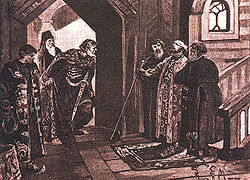
After Yury's death, Shemyaka continued to press his branch's claim to the grand princely throne, and was seldom at peace with Vasily II. Initially, Dmitry and his younger brother Dmitry Krasny concluded an alliance with Vasily against their elder brother Vasily Kosoy, who had proclaimed himself grand prince. They succeeded in driving Kosoy from Moscow and were rewarded with the towns of Uglich and Rzhev. The following year Shemyaka came to Moscow in order to invite Vasily II to his impending wedding with a princess of Yaroslavl, but was accused of siding with Kosoy and taken prisoner. He was released on the eve of a decisive clash between Vasily II and Vasily Kosoy. This action of Vasily II was successful - Shemyaka and his people did not help Vasily Kosoy and so he was completely defeated in the battle on the Cheryokha River in 1436, captured and blinded. Soon after, Shemyaka entered into an agreement with Vasily II, recognizing him as his suzerain ("older brother"). Next year, he was sent by Vasily II to expel the exiled Golden Horde Khan Ulugh Muhammad, but was defeated in the battle of Belyov. When Ulugh Muhammad in his turn besieged Moscow in 1439, Dmitry didn't send his troops to Vasily and only the mediation of a Trinity hegumen could forestall a new civil war between the cousins.
The two men maintained an uneasy peace for much of the next decade until 1445, when Vasily II was taken prisoner by Olug Moxammat after the Muscovite forces were surprised by the Tatar prince outside Suzdal, Shemyaka seized Moscow, had the recently released Vasily blinded and proclaimed himself the Grand Prince of Vladimir. He could claim this by right of lateral inheritance since his father had sat on the throne. (A prince was excluded from the succession (izgoi) if his father had not sat on the throne before him.[ citation needed ]) Shemyaka's lack of support among the Muscovite boyars forced him, however, to leave the city for Lake Chukhloma, but he continued to press his claim to the grand princely throne.
Despite several peace treaties, Shemyaka continued to plot against his cousin. He suffered a series of defeats in 1450 and 1452 which forced him to seek refuge in Novgorod. There, on July 17, 1453, he was poisoned while eating a dinner of chicken in the Gorodishche, the princely compound south of the Market side of the city, [1] his cook having been bribed by Muscovite agents. Delighted at the news, Vasily II ennobled a herald who had first brought him the message of Shemyaka's death. Nikolai Karamzin famously wrote in his history that the grand prince showed "indecent joy" at the news of his rival's untimely demise.
According to chronicle sources, Shemyaka was buried in the Church of St. George in the Yuriev Monastery south of Novgorod, [2] however, twentieth-century archaeological excavations of the necropolis of the Cathedral of Holy Wisdom in the Novgorod Kremlin suggest that the prince was actually buried there and his grave has been misidentified since at least 1616 as that of Prince Fedor Yaroslavich (died 1233). [3]
In the aftermath of Shemyaka's murder, his wife and son fled Novgorod to the Grand Duchy of Lithuania, where they were given Rylsk and Novgorod-Seversky in appanage.[ citation needed ]
Shemyaka's male line died out by 1561, but there are many living descendants from his daughter's marriage to Prince Alexander Chertoryzhsky.[ original research? ]
Shemyaka's name survives in the Russian expression "Shemyakin sud" ("Shemyaka's Justice", "Shemyaka's Judgement"), which means hasty and unfair judgement. It comes from the 17th century literary work The Tale of Shemyaka's Judgement (see its translation here [4] ). However modern researchers question the identification of Dmitry Shemyaka with Judge Shemyaka in the tale.
Related Research Articles
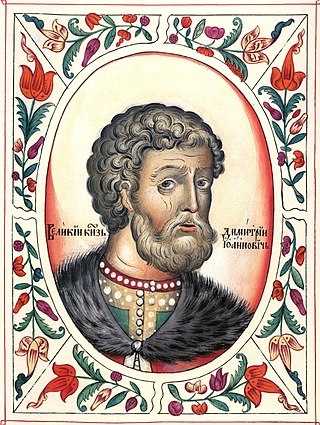
Dmitry Ivanovich Donskoy was Prince of Moscow from 1359 and Grand Prince of Vladimir from 1363 until his death. He was the heir of Ivan II.
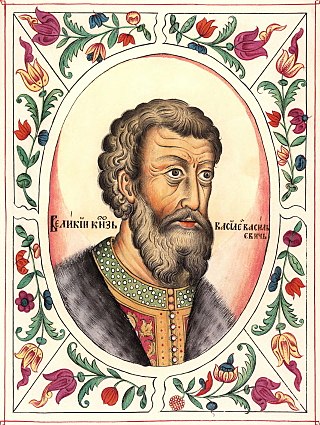
Vasily II Vasilyevich, also known as Vasily the Blind or Vasily the Dark, was a Grand Prince of Moscow in the 15th century. When his father died in 1425, the 10-year-old Vasily and his uncle Dmitry Shemyaka started fighting over the right to the throne, causing the Muscovite War of Succession (1425–1453). At one point, Vasily was captured and blinded by his opponents. Only after winning a decades-long bloody family struggle, during which Ulugh of Kazan captured Vasily and made him his vassal, was his reign finally generally accepted. Due to his disability, he made his son Ivan III his co-ruler in his late years.

Ivan III Vasilyevich, also known as Ivan the Great, was Grand Prince of Moscow and all Russia from 1462 until his death in 1505. Ivan served as the co-ruler and regent for his blind father Vasily II before he officially ascended the throne.

Mikhail Yaroslavich, also known as Michael or Mikhail of Tver, was a Prince of Tver who ruled as Grand Prince of Vladimir from 1304 until 1314 and again from 1315 to 1318. He was canonized and counted among the saints of the Russian Orthodox Church.
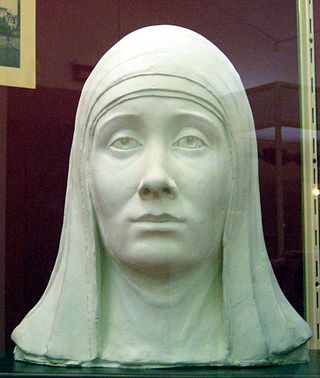
Eudoxia of Moscow, also known by her monastic name Euphrosyne, was the grand princess of Moscow during her marriage to Dmitry Donskoy.

Mikhail Alexandrovich was Grand Prince of Tver and briefly held the title of Grand Prince of Vladimir. He was one of only two Tver princes after 1317 to hold the grand princely title, which was almost the exclusive purview of the Muscovite princes.
The Treaty of Yazhelbitsy was a peace treaty signed by Vasili II, Grand Prince of Moscow and Vladimir, and the government of Novgorod the Great in the village of Yazhelbitsy in February 1456. This treaty was a significant setback for Novgorod, which would culminate, almost quarter of a century later, in the city being brought under the direct control of the Muscovite Grand Prince in 1478.
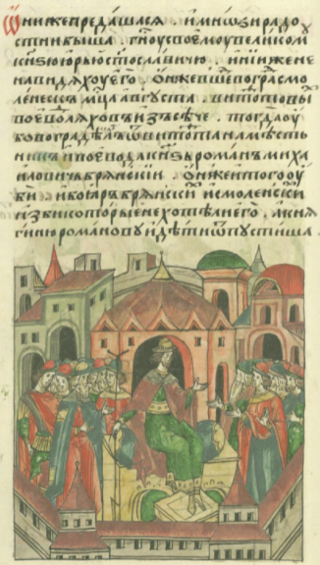
Yury Svyatoslavich or Georgy Svyatoslavovich was the last sovereign ruler of the Principality of Smolensk and Bryansk whose life was spent in vain attempts to fend off aggression by the Grand Duchy of Lithuania.
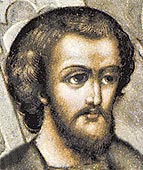
Yury Dmitrievich, also known as George II of Moscow, Yury of Zvenigorod and Jurij Zwenihorodski, was the second son of Dmitri Donskoi. He was the Duke of Zvenigorod and Galich from 1389 until his death. During the reign of his brother Vasily I, he took part in the campaigns against Torzhok (1392), Zhukotin (1414), and Novgorod (1417). He was the chief orchestrator of the Muscovite Civil War against his nephew, Vasily II, in the course of which he twice took Moscow, in 1433 and 1434.
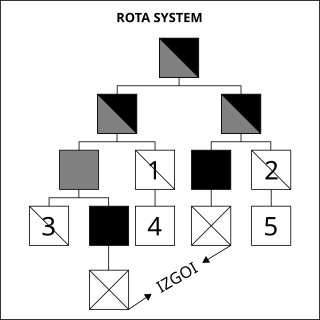
The rotasystem or the lestvitsa system was a system of collateral succession practiced in Kievan Rus', later appanages, and early the Grand Duchy of Moscow. In this system, the throne passed not linearly from father to son, but laterally from brother to brother and then to the eldest son of the eldest brother who had held the throne. The system was rationalised by Yaroslav the Wise, who assigned each of his sons a principality based on seniority, though it predates his reign and was also used among the Norse of Great Britain and Ireland.
The Prince of Moscow, later known as the Grand Prince of Moscow, was the title of the ruler of the Principality of Moscow, initially a part of the grand principality of Vladimir-Suzdal. By the late 14th century, the grand principality was inherited by the prince of Moscow; the monarch bore the title of grand prince of Vladimir and Moscow and later the title of grand prince of Vladimir, Moscow and all Russia.
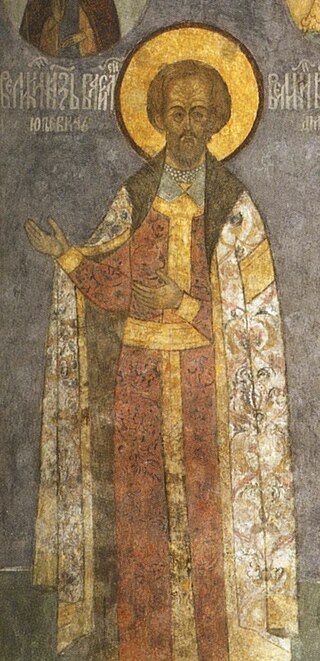
Vasiliy Yuryevich Kosoy (the Squint) (Russian: Василий Юрьевич Косой; ca. 1401–1448) was prince of Zvenigorod from 1421. He continued his father's claim on the title of Grand Prince of Moscow in 1434.
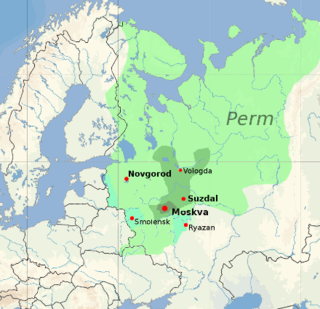
The Principality of Moscow or Grand Duchy of Moscow, also known simply as Muscovy, was a principality of the Late Middle Ages centered on Moscow. It eventually evolved into the Tsardom of Russia in the early modern period. The princes of Moscow were descendants of the first prince Daniel, referred to in modern historiography as the Daniilovichi, a branch of the Rurikids.

Daniil Aleksandrovich, also known as Daniil of Moscow, was the youngest son of Alexander Nevsky and forefather of all Princes of Moscow. His descendants are known as the Daniilovichi.

Maria Yaroslavna of Borovsk, also known by her monastic name Marfa, was the grand princess of Moscow during her marriage to Vasily II of Moscow. She was a granddaughter of Feodor Koshka, and the mother of Ivan III of Russia.

The Muscovite War of Succession, or Muscovite Civil War, was a war of succession in the Grand Duchy of Moscow (Muscovy) from 1425 to 1453. The two warring parties were Vasily II, the son of the previous Grand Prince of Moscow Vasily I, and on the other hand his uncle, Yury Dmitrievich, the Prince of Zvenigorod, and the sons of Yuri Dmitrievich, Vasily Kosoy and Dmitry Shemyaka. In the intermediate stage, the party of Yury conquered Moscow, but in the end, Vasily II regained his crown.

The Principality of Tver was a principality which existed between the 13th and the 15th centuries with its capital in Tver. It was one of the states established after the decay of the Kievan Rus'. During the 14th century, Tver rivaled the Principality of Moscow with the aim to become the center of the united Russian state. Eventually it lost, decayed, and in 1485, it was annexed by Moscow. The principality was located approximately in the area currently occupied by Tver Oblast and the eastern part of Smolensk Oblast in Russia.
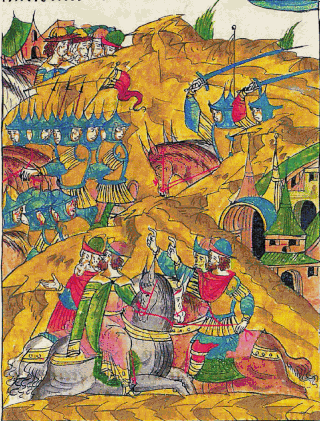
The Battle of Belyov was fought in 1437 near Belyov between the troops of the Grand Duchy of Moscow under the command of Dmitry Shemyaka and Tatars led by Ulugh Muhammad. The result of the battle was the complete defeat of the Russian army.
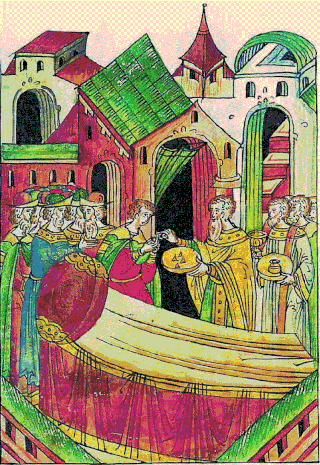
Dmitriy Yurievich Krasny, was a Russian nobleman, the youngest son of Yury of Zvenigorod and Anastasia of Smolensk, and grandson of Dmitry Donskoy. He was the appanage prince of Galich-Mersky and took part in the Great Feudal War. The strange circumstances of his death are described in chronicles with many details and cause speculation about possible poisoning.
References
- ↑ Valentin Yanin, "Posmertnaia Sudba Dmitriia Shemiaki," in Srednevekovyi Novgorod (Moscow: Nauka, 2004), 342.
- ↑ Yanin, "Posmertnaia Sudba Dmitriia Shemiaki," 342.
- ↑ Yanin, Nekropol' Novgorodskogo Sofiiskogo sobora: tserkovnaia traditsiia i istoricheskaia kritika (Moscow: Nauka, 1988), 89-113; Idem, "Posmertnaia Sudba Dmitriia Shemiaki", 337-346.
- ↑ "The Judgment of Shemyaka"
Sources
- Zimin, Aleksandr (1991). Витязь на распутье. Феодальная война в России XV в.[The Knight at the Crossroads. The feudal war in Russia of the 15th century]. Moscow: Мысль. ISBN 5-244-00518-9.